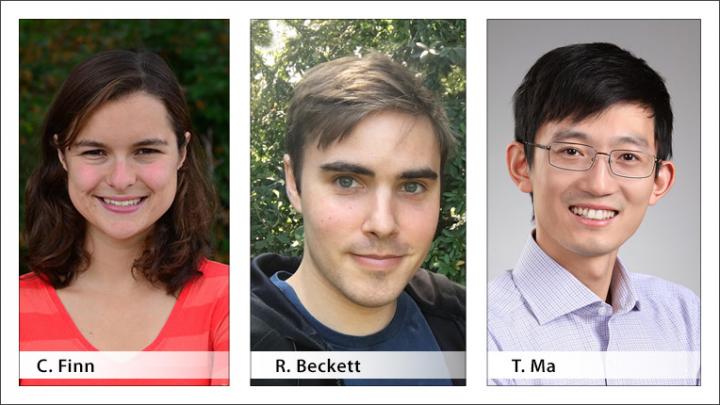Finn’s breakthrough approaches significantly advanced machine learning and robotics

Credit: Association for Computing Machinery
ACM, the Association for Computing Machinery, today announced that Chelsea Finn receives the 2018 ACM Doctoral Dissertation Award for her dissertation, “Learning to Learn with Gradients.” In her thesis, Finn introduced algorithms for meta-learning that enable deep networks to solve new tasks from small datasets, and demonstrated how her algorithms can be applied in areas including computer vision, reinforcement learning and robotics.
Deep learning has transformed the artificial intelligence field and has led to significant advances in areas including speech recognition, computer vision and robotics. However, deep learning methods require large datasets, which aren’t readily available in areas such as medical imaging and robotics.
Meta-learning is a recent innovation that holds promise to allow machines to learn with smaller datasets. Meta-learning algorithms “learn to learn” by using past data to learn how to adapt quickly to new tasks. However, much of the initial work in meta-learning focused on designing increasingly complex neural network architectures. In her dissertation, Finn introduced a class of methods called model-agnostic meta-learning (MAML) methods, which don’t require computer scientists to manually design complex architectures. Finn’s MAML methods have had tremendous impact on the field and have been widely adopted in reinforcement learning, computer vision and other fields of machine learning.
At a young age, Finn has become one of the most recognized experts in the field of robotic learning. She has developed some of the most effective methods to teach robots skills to control and manipulate objects. In one instance highlighted in her dissertation, she used her MAML methods to teach a robot reaching and placing skills, using raw camera pixels from just a single human demonstration.
Finn is a Research Scientist at Google Brain and a postdoctoral researcher at the Berkeley AI Research Lab (BAIR). In the fall of 2019, she will start a full-time appointment as an Assistant Professor at Stanford University. Finn received her PhD in Electrical Engineering and Computer Science from the University of California, Berkeley and a BS in Electrical Engineering and Computer Science from the Massachusetts Institute of Technology.
Honorable Mentions
Honorable Mentions for the 2018 ACM Doctoral Dissertation Award go to Ryan Beckett and Tengyu Ma, who both received PhD degrees in Computer Science from Princeton University.
Ryan Beckett developed new, general and efficient algorithms for creating and validating network control plane configurations in his dissertation, “Network Control Plane Synthesis and Verification.” Computer networks connect key components of the world’s critical infrastructure. When such networks are misconfigured, several systems people rely on are interrupted–airplanes are grounded, banks go offline, etc. Beckett’s dissertation describes new principles, algorithms and tools for substantially improving the reliability of modern networks. In the first half of his thesis, Beckett shows that it is unnecessary to simulate the distributed algorithms that traditional routers implement–a process that is simply too costly–and that instead, one can directly verify the stable states to which such algorithms will eventually converge. In the second half of his thesis, he shows how to generate correct configurations from surprisingly compact high-level specifications.
Beckett is a researcher in the mobility and networking group at Microsoft Research. He received his PhD and MA in Computer Science from Princeton University, and both a BS in Computer Science and a BA in Mathematics from the University of Virginia.
Tengyu Ma’s dissertation, “Non-convex Optimization for Machine Learning: Design, Analysis, and Understanding,” develops novel theory to support new trends in machine learning. He introduces significant advances in proving convergence of nonconvex optimization algorithms in machine learning, and outlines properties of machine learning models trained via such methods. In the first part of his thesis, Ma studies a range of problems, such as matrix completion, sparse coding, simplified neural networks, and learning linear dynamical systems, and formalizes clear and natural conditions under which one can design provable correct and efficient optimization algorithms. In the second part of his thesis, Ma shows how to understand and interpret the properties of embedding models for natural languages, which were learned using nonconvex optimization.
Ma is an Assistant Professor of Computer Science and Statistics at Stanford University. He received a PhD in Computer Science from Princeton University and a BS in Computer Science from Tsinghua University.
The 2018 Doctoral Dissertation Award recipients will be formally recognized at the annual ACM Awards Banquet on June 15 in San Francisco.
###
About the ACM Doctoral Dissertation Award
Presented annually to the author(s) of the best doctoral dissertation(s) in computer science and engineering. The Doctoral Dissertation Award is accompanied by a prize of $20,000, and the Honorable Mention Award is accompanied by a prize totaling $10,000. Winning dissertations will be published in the ACM Digital Library as part of the ACM Books Series.
About ACM
ACM, the Association for Computing Machinery is the world’s largest educational and scientific computing society, uniting computing educators, researchers and professionals to inspire dialogue, share resources and address the field’s challenges. ACM strengthens the computing profession’s collective voice through strong leadership, promotion of the highest standards, and recognition of technical excellence. ACM supports the professional growth of its members by providing opportunities for life-long learning, career development, and professional networking.
Media Contact
Jim Ormond
[email protected]
Original Source
https:/



